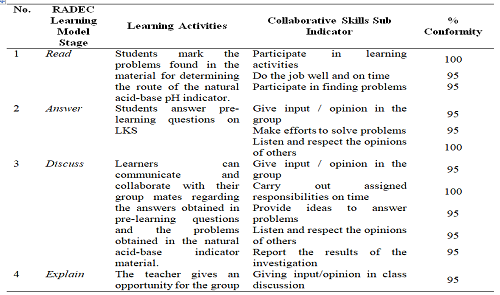
Feasibility Analysis of Radec Learning Designs to Build Students’collaboration Skills In Determining pH Routes From Natural Indicators
Abstract
Keywords
Full Text:
PDFReferences
Agustin, M., Pratama, Y. A., Sopandi, W., & Rosidah, I. (2021). Pengaruh Model Pembelajaran Radec Terhadap Keterampilan Berpikir Tingkat Tinggi Mahasiswa PGSD. Jurnal Cakrawala Pendas.
Alves, A. C., Mesquita, D., Moreira, F., & Fernandes, S. (2012). Teamwork in Project-Based Learning : perceptions of strengths and weaknesses 1 Introduction 2 Context of the Study. Proceedings of the Fourth International Symposium on Project Approaches in Engineering Education (PAEE’2012).
Anggraeni, P., Sopandi, W., Septinaningrum, S., Hayati, A., Tursinawati, T., & Yosi Gumala, Y. G. (2021). Keterampilan Berpikir Kritis Mahasiswa PGSD Melalui Pembelajaran Read-Answer-Discuss-Explain-And Create (RADEC) yang Berorientasi Penyelidikan. Caruban: Jurnal Ilmiah Ilmu Pendidikan Dasar.
Arikunto, S. (2010). Prosedur penelitian. PT Rineka.
Care, E., Griffi, P., Scoular, C., Awwal, N., & Zoanetti, N. (2015). Assessment and Teaching of 21st Century Skills. Assessment and Teaching of 21st Century Skills, 85–104.
Grant, M. (2002). Getting a grip on project-based learning: theory, cases, and recommendations. Meridian: A Middle School Computer Technologies Journal, 5 (1). Journal of Research on Technology in Education.
Handayani, H., Sopandi, W., Syaodih, E., Setiawan, D., & Suhendra, I. (2019). Dampak Perlakuan Model Pembelajaran Radec Bagi Calon Guru Terhadap Kemampuan Merencanakan Pembelajaran di Sekolah Dasar. Pendas : Jurnal Ilmiah Pendidikan Dasar.
Hinyard, L., Toomey, E., Eliot, K., & Breitbach, A. (2019). Student Perceptions of Collaboration Skills in an Interprofessional Context: Development and Initial Validation of the Self-Assessed Collaboration Skills Instrument. Evaluation and the Health Professions.
Istiyono, E., Mardapi, D., & Suparno, S. (2014). Pengembangan Tes Kemampuan Berpikir Tingkat Tinggi Fisika (Pysthots) Peserta Didik SMA. Jurnal Penelitian Dan Evaluasi Pendidikan, 18(1), 1–12.
Kay, K., & Greenhill, V. (2011). Twenty-First Century Students Need 21st Century Skills. In Bringing Schools into the 21st Century.
Laub, J. A. (1999). Assessing the servant organization; Development of the Organizational Leadership Assessment (OLA) model. Dissertation Abstracts International,. Procedia - Social and Behavioral Sciences.
Leopold, H., & Smith, A. (2020). Implementing reflective group work activities in a large chemistry lab to support collaborative learning. Education Sciences.
Maruf, A. S., Wahyu, W., & Sopandi, W. (2020). Colloidal Learning Design using Radec Model with Stem Approach Based Google Classroom to Develop Student Creativity. Journal of Educational Sciences.
Neiles, K. Y., Bowers, G. M., Chase, D. T., Vermeulen, A., Hovland, D. E., Bresslour-Rashap, E., Eller, L., & Koch, A. S. (2019). Teaching Collaborations and Scientific Practices through a Vertically Scaffolded Biodiesel Laboratory Experience. Journal of Chemical Education.
Noor, J. (2011). Metodologi Penelitian: Skripsi, Tesis, Disertasi, & Karya Ilmiah. Metodologi Penelitian: Skripsi, Tesis, Disertasi, & Karya Ilmiah.
Pratama, Y. A., Sopandi, W., & Hidayah, Y. (2019). Model Pembelajaran Radec (Read-Answer-Discuss-Explain And Create): Pentingnya Membangun Keterampilan Berpikir Kritis Dalam Konteks Keindonesiaan. Indonesian Journal of Learning Education and Counseling.
Putra, M. J. A., Widodo, A., & Sopandi, W. (2018). Content Representation on Earth and Space Topic by Experienced and Prospective Primary Teachers.
Rahman, A., Suherman, A., Susilawati, D., & Putra, G. P. (2020). RADEC (reading, answering, demonstrating, explaining, and creating) in lms to teach tennis without field practicing. Universal Journal of Educational Research.
Ramdani, Z., Amrullah, S., & Tae, L. F. (2019). Pentingnya Kolaborasi dalam Menciptakan Sistem Pendidikan yang Berkualitas. Mediapsi, 5(1), 40–48.
ReadWriteThink. (2005). Collaborative Work Skills Rubric. International Reading Association/Ncte., 2015. www.learningsciences.com
Redhana, I. W. (2019). Mengembangkan Keterampilan Abad Ke-21 Dalam Pembelajaran Kimia. Jurnal Inovasi Pendidikan Kimia, 13(1).
Riduwan. (2015). Skala Pengukuran Variabel-Variabel Penelitian. Alfabeta.
Rohmawatiningsih, W., Rachman, I., & Yayoi, K. (2021). The implementation of RADEC learning model in thematic learning to increase the concept understanding of electrical phenomenon. Momentum: Physics Education Journal.
Setyosari, P. (2019). Pembelajaran Kolaborasi Landasan untuk mengembangkan keterampilan sosial, rasa saling menghargai dan tanggung jawab - Prof. Dr. Punaji Setyosari 2009.pdf.
Sharma, P., Gupta, R., Roshan, S., Sahu, S., Tantuway, S., Shukla, A., & Garg, A. (2016). Plant extracts as acid base indicator : an Plant Extracts as Acid Base Indicator : An Overview. In inventi.
Sopandi, W. (2017). The quality improvement of learning processes and achievements through the read-answer-discuss-explain-and create learning model implementation. Proceeding 8th Pedagogy International Seminar 2017: Enhancement of Pedagogy in Cultural Diversity Toward Excellence in Education.
Sopandi, W. (2019). Sosialisasi dan Workshop Implementasi Model Pembelajaran RADEC Bagi Guru-Guru Pendidikan Dasar dan Menengah [Dissemination and Implementation Workshop of RADEC Learning Models for Primary and Secondary Education Teachers]. PEDAGOGIA: Jurnal Pendidikan, 8(1), 19.
Spektor-Levy, O., Eylon, B. S., & Scherz, Z. (2008). Teaching communication skills in science: Tracing teacher change. Teaching and Teacher Education, 24(2), 462–477.
Sumarni, W. (2015). The strengths and weaknesses of the implementation of project based learning: A review. International Journal of Science and Research, 4(3), 478-484.
Trilling, B., & Fadel, C. (2009). Learning Past and Future. In 21st century skills : learning for life in our times.
Wiersma, W., & Jurs, S. G. (2009). Research Methods in Education an Introduction. : Pearson Education, Inc.
Wijaya, E. Y., Sudjimat, D. A., & Nyoto, A. (2016). Transformasi pendidikan abad 21 sebagai tuntutan pengembangan sumber daya manusia di era global. Prosiding Seminar Nasional Pendidikan Matematika 2016.
Zubaidah, S. (2019). Keterampilan Abad Ke-21: Keterampilan Yang Diajarkan Melalui Pembelajaran. Seminar Nasional Pendidikan Dengan Tema “Isu-Isu Strategis Pembelajaran MIPA Abad 21, Desember, 1–17.
DOI: http://dx.doi.org/10.31258/jes.6.1.p.35-45
Refbacks
- There are currently no refbacks.
Copyright (c) 2022 Dini Intania Sari, Wawan Wahyu, Wahyu Sopandi

This work is licensed under a Creative Commons Attribution 4.0 International License.
Publisher: FKIP Universitas Riau













